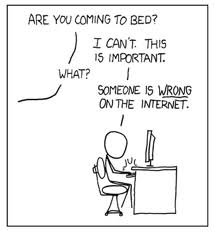I, for one, find it frustrating to spend a few hours researching and composing a post, only to have someone some back with a 'Yeah, but this poorly researched article I found on a political commentary site says...'.
I can come back, spend a few more hours doing research to refute the next article, but realize that:
1) I'm retired. Ain't nobody paying me some ridiculising salary to do that sort of research any more.
2) When the 'yeah, but what if' starts to get into discussing the finer points of items with such a low statistical significance that there won't be a measurable impact, that is, when the odds for my dying from an asteroid strike or from cancer causing agents in my espresso are higher by many orders of magnitude, the conversation is meaningless. Might as well discuss the number of angels that can dance on the head of a pin. "Waltz, or line dancing?"
3) Others aren't here for a rational discussion. They're here for an argument. You want room 12A, just along the corridor.
I've put a fair number of hours into trying to provide reasonable information here. I haven't seen any hard numbers, statistics, or really much beyond posts referencing sensationalist or blatantly fear mongering articles. "We came close to losing northern Japan." Gah.
Gundersen had never said there was, or could be, a nuclear explosion there. I pointed this out, and M. Paquette replied by giving a long list of places people could use to donate to victims of the Japan earthquake. That's charming, but it's not a relevant argument.
I also said, in reference to 'losing northern Japan' and the reaction others had, that:
That's the usual cognitive jump folks make when hearing about a reactor problem, and someplace becoming uninhabitable.
I'm sorry that you found a list of charities and organizations in need of donations to assist in the very real, deadly, and destructive earthquake and tsunami in that region to be 'charming'.
It appears that folks would rather spend time fearing and worrying about abstract scary stuff that takes a bit of effort to understand, than making the effort to improve their understanding and perhaps replace fear of the unknown with actual knowledge.
It would be great to have our own expert nuclear engineers here, to inform our non-scientific opinions, if they were in a mood to give honest and informative assessments, but currently, they seem to be more inclined to be dismissive, regardless of the facts.
My experience has been that people tend to devalue factual information provided at no charge, but will give great weight to information that they obtain at some expense. I suggest that you engage a team of nuclear engineers out of pocket to address your concerns. When paying them several hundreds of dollars an hour to address your questions, I can safely say that they won't be dismissive, but will be quite thorough and methodical. You may also give greater weight to their responses, of course.
Now, where's that darn pig? Soooooieeeee!


